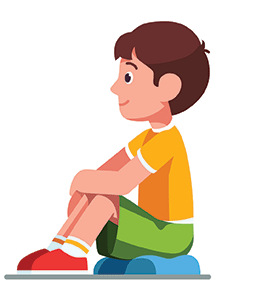Sensory Classroom Interventions
Lauren Haack and Madeline Spiess
Attention Magazine October 2019
Download PDF
 This research update highlights two recent studies evaluating the drawbacks and benefits of sensory classroom interventions (specifically, fidget spinners and wiggle seats) utilizing reversal crossover-withdrawal designs.
This research update highlights two recent studies evaluating the drawbacks and benefits of sensory classroom interventions (specifically, fidget spinners and wiggle seats) utilizing reversal crossover-withdrawal designs.
Do children with ADHD do better if they can use fidget spinners in school?
The first study’s goal was to examine if the use of fidget spinners by children with ADHD impacts gross motor activity, decreases attention/behavioral functioning in the classroom, and/or distracts other children.
During the beginning and toward the end of an intensive, empirically supported behavioral intervention (the Summer Treatment Program, or STP), 60 children diagnosed with ADHD (average age 4-5 years old) were observed and monitored with accelerometers during a daily academic classroom period. Researchers utilized an A-B-A-B reversal design—which is when an intervention is introduced after an initial observation phase, systematically withdrawn, and then reintroduced—to examine if children do better with or without fidget spinners in the classroom. Counselors coached selected students to use fidget spinners in an appropriate manner while simultaneously implementing standard STP rules and behavior management.
Researchers observed that children consistently used the fidget spinners when given the opportunity to do so. Accelerometer readings showed that children took fewer steps when using the fidget spinner in the initial phase of the study but not the latter phase. This suggests that once an evidence-based behavioral classroom intervention is established (as occurs in STP), the positive impact of fidget spinner use on hyperactivity fades. Researchers were surprised to find that the use of fidget spinners by a few children in the classroom did not appear to disturb or distract others.
Perhaps most importantly, children made more attention errors when using fidget spinners throughout the study, suggesting that fidget spinner use is detrimental to children’s focus even when they are receiving evidence-based classroom intervention. Thus, fidget spinners should not be endorsed as an effective classroom management tool for children with ADHD and other interventions supported by research (such as daily report cards) should be emphasized instead.
Graziano, P. A., Garcia, A. M., & Landis, T. D. (in press). To Fidget or Not to Fidget, That Is the Question: A Systematic Classroom Evaluation of Fidget Spinners Among Young Children with ADHD. Journal of Attention Disorders (epub ahead of print).
https://www.researchgate.net/publication/324655453_To_Fidget_or_Not_to_Fidget_That_Is_the_Question_A_Systematic_Classroom_Evaluation_of_Fidget_Spinners_Among_Young_Children_With_ADHD
Do wiggle seats help students with ADHD in the classroom setting?
In the second study, researchers aimed to test a specific form of dynamic seating for children with attention or behavior challenges: inflated, tactile cushions known as “wiggle seats.” This is important, authors argue, because effective, alternative seating for students with ADHD may have the ability to boost attention and engagement in the classroom setting, improving learning and academic success.
A total of four preschool classes participated; researchers randomly assigned two classrooms to alternate between normal seating and wiggle seats in one-week phases (A-B-A-B reversal design to see if students do better with or without wiggle seats) and the other two classrooms to maintain regular seating (A-A-A-A design to compare if children in classrooms without wiggle seats do better or worse than children in the reversal design classrooms).
Teachers in all classrooms were instructed to carry out individualized curriculum activities and standardized daily lesson components (including a morning message, calendar, weather, a story and a song) during the study. Researchers video-taped these activities in 7-10 minute components and rated children’s classroom engagement using the Child Behavior Rating Scale, which measures domains of affect, attention, involvement-distractibility, joint attention, and persistence.
Results from the 25 children with sufficient data to analyze suggest that engagement (particularly in the domains of attention and persistence) improves when children are allowed a wiggle seat. Further, students using wiggle seats were observed as more participatory in group songs and activities, as well as less disruptive and distracted in side conversations. Participating teachers noted that not all students appeared to need the wiggle cushions; however, they appeared very helpful for certain children.
Results of the study provide initial evidence that dynamic seating may positively impact attention and effort in the classroom. Educators looking for alternative seating options could consider wiggle cushions as a potentially helpful tool to improve engagement and attention for ADHD-symptomatic students in the classroom.
Seifert AM & Metz AE. (2017). The Effects of Inflated Seating Cushions on Engagement in Preschool Circle Time. Early Childhood Education Journal, 45, 411–418.
https://www.researchgate.net/publication/303914578_The_Effects_of_Inflated_Seating_Cushions_on_Engagement_in_Preschool_Circle_Time
Lauren Haack, PhD, is an assistant professor and attending psychologist in the department of psychiatry at the University of California, San Francisco. Her research program and clinical practice focus on accessible and culturally attuned evidence-based services for vulnerable youth and families, with a particular specialty in ADHD services for children in Spanish-speaking, Latinx families.
Madeline Spiess is a clinical research coordinator in the department of psychiatry at the University of California, San Francisco. She currently works alongside psychologists within the HALP clinic, including Dr. Haack, to coordinate ADHD-related clinical trials and further develop culturally competent ADHD services and programs for youth and their families.
Other Articles in this Edition
My First ADHD Conference Changed My Life
Connection and Community: ADHD reWired Coaching and Accountability Groups
More Than Refills: The Importance of Regular Follow-Up Visits
Treating ADHD and Emotion Dysregulation
Coach Your Child to Play Better
Organize Assignments with Customizable Apps
Is There a “Right Fit” College for My Student with ADHD?
Where Can Adults with ADHD Find the Best Treatment?
